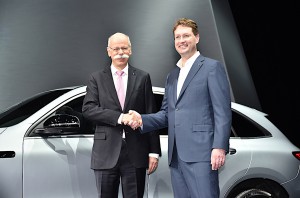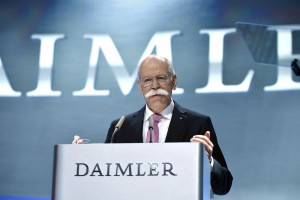With the auto industry facing a turbulent transformation, Daimler AG is putting in place a new corporate structure and a new leadership team, while vowing to remain committed to what its outgoing chief executive described as a sustainable future.
Dieter Zetsche, who has led Daimler AG for the past 13 years and who a German business magazine recently described as the only “world class business leader in the auto industry,” relinquishes his dual role as chief executive officer as a chairman of the board of management and head of Mercedes-Benz cars.
Ola Kallenius will replace Zetsche and take on the dual role as CEO and head of Mercedes-Benz Cars. In addition, Harold Wilhelm will replace Daimler’s long-serving chief financial officer, Bodo Ubber. In addition, Markus Schaefer will take over Kallenius’ previous role as head of research and development and a broader role for Brita Seeger, chief of sales for Mercedes-Benz Cars.
Zetsche is tentatively scheduled to return in two years when he will replace Manfred Bischoff as chairman of Daimler’s independent board of supervisors, which is responsible for hiring a firing of senior executives and capital expenditures and other critical issues related to corporate governance.
With a view to future challenges and the required social acceptance, Daimler is anchoring sustainability even more firmly in the corporate strategy, Zetsche said.
(Daimler prepares cost-cutting plans for new chief Kallenius. Click Here for the story.)

Dieter Zetsche, left, hands over the top job at Daimler AG to Ola Kallenius, right, during the automaker's annual meeting.
“Our goal is to act sustainably in all areas of our business – from conserving resources and complying with environmental regulations to data protection and respect for human rights,” said Zetsche. “However, the main focus of our attention at present is on the low-emission car.
“This is because the number of vehicles on the roads will continue to rise as a result of global demand. Emissions must therefore be reduced all the more urgently. For us, the Paris Climate Agreement is more than a commitment – it is a conviction.”
Zetsche told restless shareholders, concerned about the drop in the value of the company’s share over the past years that under the title “Ambition 2039”, the Mercedes-Benz Cars division has set itself ambitious yet realistic goals.
Mercedes-Benz is taking a holistic view of sustainability along the entire value chain. The aim is to transform the entire portfolio of new cars into a carbon dioxide-neutral range of vehicles by 2039, he said.
“Daimler has made significant progress in recent years, although we are not satisfied with the latest quarterly results and the share price,” Zetsche added. “For a time, we were active troubleshooters and we refocused the company on what we do best: vehicles that convince rationally and inspire emotionally. Then we went on the offensive. With Mercedes-Benz, we wanted to lead the premium segment by 2020.”
Zetsche also told shareholders that China is now the “dynamo” that drives Daimler, accounting for more than 30% of the company’s sales.
(Click Here for more about Mercedes taking orders for the new EQC battery-electric vehicle.)

Attendees at this year's Daimler annual shareholder meeting offered some critical remarks about the company.
But speakers representing large blocs of shares, noted that Daimler was facing enormous and expensive challenges as the auto industry moves into a new era that is altering expectations about future technology and mobility. “Daimler has an underlying problem with efficiency, which Mr. Zetsche has never addressed. As fast as you earn the money, you spend it,” one critical shareholder representative said.
At the same time, the company faces lawsuits about its diesel engines that could stop Zetsche from assuming a new role with the company, speakers noted.
Meanwhile, shareholders were asked to vote on a resolution that would then clear the way for the group to combine the car and van businesses as well as the truck and bus businesses into two legally independent entities by way of a spin off.
Mercedes-Benz AG is to be responsible for the Mercedes-Benz Cars and Mercedes-Benz Vans divisions, while the Daimler Trucks and Daimler Buses divisions are to be controlled by Daimler Truck AG. Daimler Financial Services AG, which is already legally independent, will be called Daimler Mobility AG starting July 24. The two new companies, like the current Daimler AG and the future Daimler Mobility AG, would be co-determined German stock corporations subject with registered offices in Stuttgart.
Bischoff said the resolution represents the most comprehensive reorganization in Daimler’s more than 130-year corporate history and, in addition to the business operations in Germany, will involve approximately 800 subsidiaries in more than 60 countries. In terms of revenue and total number of employees at Daimler AG, it is also the largest reorganization that has taken place at a German company in recent years.
“Daimler aspires to be a leader in the new era of mobility,” Bischoff said.
(To see more about Daimler’s “carbon neutral” plans under Ambition 2039, Click Here.)
“With ‘Project Future,’ Daimler is giving itself a corporate structure that reflects and supports its strategic orientation,” said Bischoff. “Strong customer-oriented divisions will significantly increase Daimler’s speed and flexibility in view of the technical and financial challenges facing the industry,” he said.

